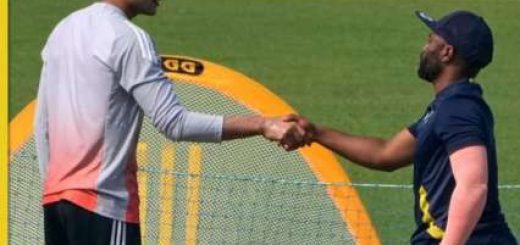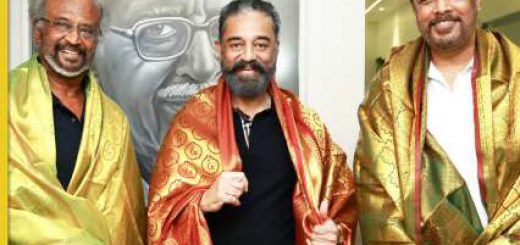Ain’t No Mountain High: New Zealand has been the story of the tournament
The fellowship Will today be the Black Caps’ day? (Source: Reuters)
“Well, George, we knocked the bastard off.”— Edmund Hillary’s first words spoken on landing in Auckland after summiting Mt Everest.
There’s a simplicity to cricket-viewing in New Zealand that borders on the profound. Elliptical rugby stadiums with short square boundaries, a truck thundering past the fenceless background, grass embankments. Mothers basking in the steely glow of the sun, fathers enjoying a chat and a beer, kids chasing after their hats in the wind, toddlers chasing after blue plastic balls with pink plastic bats. Teenagers dressed in the whole range of colours that their cricket team has adopted — white, beige, blue, blue-and-green, neon-green with a fern, brown, black. All those colours leaping up for a one-handed catch.
READ: Clarion call of popular DJ sees Kiwis flock to Melbourne
This ageless oil painting of a scenario, however, has had one welcome addition to the faces in the crowd over the course of the past year. And especially during this World Cup. Those happy faces now own the expression of belief.
So tell me, where were you when Grant Elliott knocked the most terrifying bowler in the world, Dale Steyn, 40 rows back at Eden Park; knocking South Africa out of the World Cup? Were you one of the lucky 40,000 spectators in Auckland? Or were you, like me, sitting in the comfort of your home and constantly palming your uncomfortable heart to check if it was racing too fast or not racing at all?
READ: Final act in a well-written New Zealand success story
Last round of questions. Where will you be today when they, New Zealand, take to the Melbourne Cricket Ground to knock off that other bastard, the World Cup trophy? And were they to win, will you remember it with a smile for the rest of your life? I know I will.
It’s rare to come across a fan who despises the Black Caps. Now that’s quite a statement to make in India, a land where we despise almost everything that isn’t India. Why, you ask. Because to be despised, you first need to be feared, like Pakistan or Australia. And New Zealand, for the longest time, weren’t. After all, every tragic hero worth his jersey loves a good underdog story. Brendon McCullum’s side, though, is far from being one.
These guys are different. They’re almost, well, what’s the word for it, yes that’s right, Aussie. Unlike every New Zealand team of the past, these guys are not content in being also-rans. And unlike every New Zealand unit of the past (including 1992 — the previous benchmark), these guys came into this tournament as favourites. Today, they will leave no noose unhung to leave the tournament the same way.
For years, we looked far south, beyond Australia, with patronising eyes, pupils dilating with sympathy. “Well played boys, better luck next time,” we said. “At least you have your sheep. Or Peter Jackson,” we added. “To excel in cricket, you need financial muscle, you need to be in the Big Three,” we cackled. And then lowering our voices to a whisper, we consoled: “But don’t worry, you’ll always have Martin Crowe and 1992.”
McCullum probably had his headphones on.
In February last year, just a month after a young and unheralded bloke called Corey Anderson broke Shahid Afridi’s long-standing record for the fastest ODI century, a feat by itself, McCullum helped a nation move on by surpassing Crowe’s 299 — New Zealand’s landmark score — in Test cricket. “Today, with Brendon scoring our nation’s first-ever triple-hundred, I have finally removed the one remaining stone in my shoe,” Crowe wrote in an incredibly frank column for ESPNCricinfo last year.
Over the last few weeks, however, a few more unexpected pebbles have come tumbling out.
Now, New Zealand have eight wins on the trot at this World Cup, two better than Crowe’s side from 1992. Martin Guptill has the highest individual score across World Cups, with 237 unbeaten runs he scored against West Indies in a match no less crucial than the quarterfinals. Today, they are in the final, one step away from absolute glory and one step better than every other New Zealand side of the past. Yes,better than 1992.
Six times before Tuesday, including the first World Cup in 1975 and the last World Cup in 2011, New Zealand lost at the semifinal stage. So what made 1992 chest-constrictingly heartbreaking? Well, for one, Crowe’s side played all their matches in front of their beloved and forgiving fans, just like in this tournament. But unlike in this tournament, they were far from the best team in the Cup. An exceptional leader to a bunch of mediocre players, Crowe single-handedly forced his boys to punch above their weight with masterful tactics and delicious innovations.
For the benefit of those not well versed with the greatest Kiwi tale of all (The Lord of the Rings doesn’t count), here goes. Crowe promoted a hopelessly out-of-form and below-average middle-order batsman in Mark Greatbatch to the opener’s slot and voila, cricket began borrowing baseball terms to describe his subsequent aggression. Pinch-hitting, they called it. Bat like Greatbatch during the field restrictions, all other teams barked at their openers. Revolutionary stuff. And to throw an extra spanner in the opposition’s wheel, Crowe opened the bowling with Dipak Patel, an off-spinner. These strategies were way ahead of their time and so was Crowe’s consistency with the bat.
They beat every team in the World Cup except Pakistan, to whom they lost twice. The second time in the semifinal at Auckland. This after Crowe led the way with 91. This after they posted a match-winning score of 262. This after Crowe handed over the captaincy to John Wright due to a hamstring injury. “In very dark times I blamed others, like John Wright, and I felt guilty at having done so,” moaned Crowe. “In truth, I simply blamed myself. It was the one real chance for glory for my country, to lift the World Cup, and I was beside myself that I had misjudged the moment.”
This dependency on one man, believes Ian Smith, New Zealand’s wicketkeeper in 1992, cost his side the Cup. And this lack of dependency on one man today, believes Smith again, will take New Zealand all the way. “I boil it down to one thing, these players accepting responsibility. I boil it down to the fact that each man in this side has the guts and the ability to be the hero on any given day,” he said on air, choking back joyous tears, after that monumental semifinal win on Tuesday.
To go back to Crowe’s heartfelt piece one last time, the great man said: “Cricket in New Zealand has experienced a euphoric awakening.” They have well and truly awakened in this World Cup, and it isn’t just because of McCullum, who has cracked a 49-ball 65 in the opening game against Sri Lanka, 25-ball 77 against England, 24-ball 50 against Australia, 19-ball 42 against Afghanistan, a 26-ball 59 in the semis versus South Africa and a remarkable string of victories over all of them.
Yes, he has led with astuteness and has trampled over several egos with his mighty blade as an opener — a Greatbatch and Crowe rolled into one, really. But what has really worked for him is that 10 other men have equally shared a proud sporting nation’s burden of expectations.
Until their semifinal match, when Adam Milne’s untimely injury caused Matt Henry to be flown in as replacement, McCullum played an unchanged 11. Everyone he trusted with a role came right through. In Guptill, McCullum has a perfect foil for an opening partner. Level-headed as a person and still-headed as a batsman, the 1.9 metre man does nothing more than rotate the strike while his captain is on song and cuts loose only after his dismissal, shepherding the middle-order. In Kane Williamson, the management have arguably the best batsman in the world currently on form, and without him New Zealand would’ve surely lost the thriller against Australia, which Williamson sealed with an emphatic six. This when nine wickets were down.
Between Tim Southee and Trent Boult, McCullum has one of the most lethal pace combinations in this World Cup, proven by the 36 wickets they have shared in this tournament between them. While in Anderson he has a prominent contender for Player of the Series, with 14 wickets and 231 runs (two crucial 50s) so far. And to usher back Daniel Vettori (who at 36 had one foot in an IPL franchise’s boardroom) in time for the World Cup was simply a stroke of genius. Vettori was trusted with New Zealand’s lone spinner role, and is now the leading slower bowler in this Cup with 14 scalps. Experience, priceless.
Every hunch of McCullum’s worked. Except the South African-born Grant Elliott, whose controversial selection (over the big-hitting Jimmy Neesham) paid no dividends for the first seven games of this tournament. Until McCullum wrapped his hands around him after the semifinal and all but said: “Well, Grant, we knocked one bastard off. Now all that is left is Everest itself.”
Source:: Indian Express







